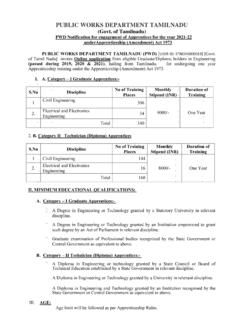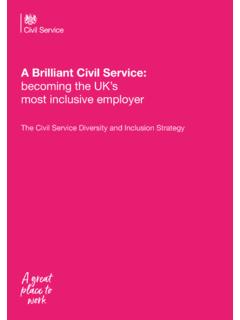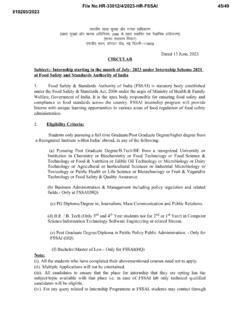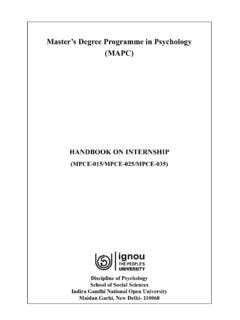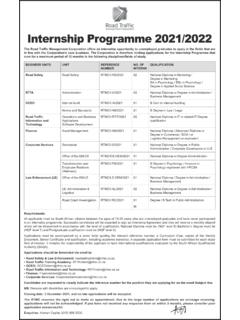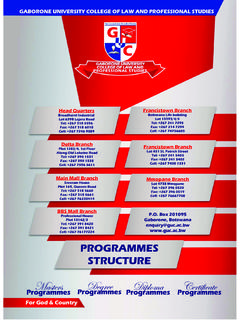Transcription of UGC Guidelines for Higher Education Institutions to offer ...
1 UGC Guidelines forHigher Education Institutions to offerApprenticeship/ internship embedded Degree ProgrammeUGC Guidelines forHigher Education Institutions to offerApprenticeship/ internship embedded Degree ProgrammeUniversity Grants CommissionBahadur Shah Zafar MargNew DelhiUniversity Grants CommissionBahadur Shah Zafar MargNew Delhiwebsite: , 2020 UGC Guidelines forHigher Education Institutions to offerApprenticeship/ internship embedded Degree ProgrammeUniversity Grants CommissionBahadur Shah Zafar MargNew DelhiJuly, 2020 University Grants CommissionJuly, 2020 Published by : Secretary, University Grants Commission, Bahadur Shah Zafar Marg, New Delhi-110002 Designed and Printed by : Chandu Press D-97, Shakarpur, Delhi-110092 Ph.
2 : +91 9810519841, 011-22526936 E-mail : is going to have the largest working age population in the world by 2030, but gainful employment for general stream students is a major challenge. Improving employability of these students requires a new vision with curricular support for employment. Apprenticeship/ internship has a prominent role to play in linking Higher Education with the requirements of the industry and the world of work. This is considered to be one of the most effective ways to develop skilled manpower for the country. It provides for an industry led, practice oriented and outcome based to fulfil this objective of improving employability and forming robust industry-academia linkage, the UGC has framed Guidelines for Higher Education Institutions to offer Apprenticeship/ internship embedded Degree Programme.
3 The UGC Guidelines will provide an option for Higher Educational Institutions to embed Apprenticeship/ internship in any UG degree programmes specified by UGC. This will focus on outcome-based learning in degree programme and will enable students to demonstrate workforce professional abilities for potential a matter of great pride and privilege, I am sharing these Guidelines and hope that this will give the much needed impetus to overcome the Employment-Employability gap. I take this opportunity to record my sincere thanks and gratitude to Prof Rajnish Jain, Secretary, UGC, Shri Madhu Ranjan Kumar, JS, MHRD & Dr. Manju Singh, JS, UGC for developing these would urge upon all Universities/Colleges to come forward and take measures to introduce Apprenticeship/ internship embedded Degree Programme in the larger interest of our July, 2020 New Delhi(Prof.)
4 Singh) Chairman University Grants Commission4 INDEXI. PREAMBLE 5II. OBJECTIVE 7 III. SCOPE General Provisions 8 Duration 9 Credit Mechanism 10 Assessment 12 Learning Outcome 13IV. ROLE OF HEIs 14V. ROLE OF INDUSTRY ASSOCIATIONS, SSC AND BOAT 15VI. MONITORING BY UGC 165 India is going to have the largest working age population in the world by 2030. To capitalise on India s remarkable demographic dividend, it is essential not only to improve the quality of Education but also to make it relevant in terms of providing employment opportunities. Aligned with the Sustainable Development Goals (SDGs), the Government of India has undertaken various initiatives to enable youth to fully participate in the job market and gain access to employment services.
5 Despite this, gainful employment is a challenge for most of the graduating students from our universities. Particularly, when we consider this for the general stream students, limited employment for graduating student is a major challenge. The primary factor responsible for this phenomenon is being non-employable . Therefore, there is a need to bridge the disconnect between what is taught in the class and what is required by the society . The competencies demanded by the industry need to be embedded in our university curriculum so that the Employment-Employability gap is overcome. The Education system has to be tailor-made to suit the requirements of the society at large and the economy in particular.
6 Further, with a large number of students enrolled in general degree programmes in India every year, there is a consensus among stakeholders for shift from academic only approach. The minimal linkage between the general degree curriculum and employer s requirement calls for an effective remodeling of degree programmes, driven by changing needs of the industry and service sector. This remodelling in turn needs a robust institutionalised framework for industry-academia linkage to increase the employability of the and internship have a huge role to play in this context. World over, apprenticeship is considered as the most efficient and promising structured training for exposure to the real working environment.
7 This has enormous potential to combine work-based learning with theoretical knowledge of related disciplines. Through apprenticeship/ internship , students may actively engage with the practical side of their learning I. PREAMBLE66like problem-solving, creative thinking, digital skills, teamwork etc. This apprenticeship/ internship experience will augment the employability of students in the general stream substantially and will also forge a close functional link between Education and industry/service sectors on a sustainable basis apart from helping the industry securing good quality manpower. Realising this need, the Budget announcement of 2020-21 set out for the introduction of Apprenticeship Embedded Degree/Diploma Programme to improve employability of general stream made to Apprenticeship Act and Apprenticeship Rules during 2014 to 2019 have opened the prospect of linking apprenticeship programme to Education .
8 The extant provisions enable non-engineering graduates, fresh non-graduates without any prior skill training, and students undergoing training as an integrated component of the curricula to undergo apprenticeship training for a minimum of six months to a maximum of three years. The flexible curricular structure will create new possibilities for outcome-based learning and facilitate graduation degree described in terms of such learning , with the objective of making the fresh graduates employment-ready with necessary knowledge, competencies and attitude, UGC has formulated these Guidelines for Higher Education Institutions to offer Apprenticeship/ internship embedded Degree Programme for embedding apprenticeship/ internship in general degree programmes offered by the Universities.
9 These Guidelines will enable the apprenticeship/ internship embedded Degree programme in general stream with cooperation between Industry and To improve the employability of students pursuing Undergraduate level general degree To focus on outcome-based learning in degree To promote active linkage between the Higher Education system and industry, non-commercial and commercial OBJECTIVES78 III. SCOPE1. Any UG degree programme in all disciplines as specified by the UGC under section 22 (3) of the UGC Act, 1956 is eligible to embed apprenticeship/internshipin to the degree An apprenticeship/ internship embedded degree programme shall be treated at par with the UG degree programmes specified by the UGC under section 22 (3) of the UGC Act, Students graduating from the apprenticeship/ internship embedded degree programme shall be eligible to take admission in the Master s programme in the specific subject in which they have earned their undergraduate degree ( bachelor degree) as well as in subject(s)
10 For which they have taken 24 credits in the core subjects as a part of their undergraduate programme (see para 18 and para 19 for details). Such students shall also be considered eligible for transdisciplinary vertical mobility into such courses where entry qualification is a Bachelor Degree without specific requirements in a particular The HEIs in consultation with Sector Skill Councils, AICTE, FICCI, CII, commercial and non-commercial organizations or enterprises, and industry would design the apprenticeship/ internship embedded degree programme in a way consistent with these Embedding apprenticeship/ internship will offer a kind of a traineeship which shall be undertaken not on the campus but at the premises of the workplace like commercial or non-commercial organizations or enterprises, or offices.





